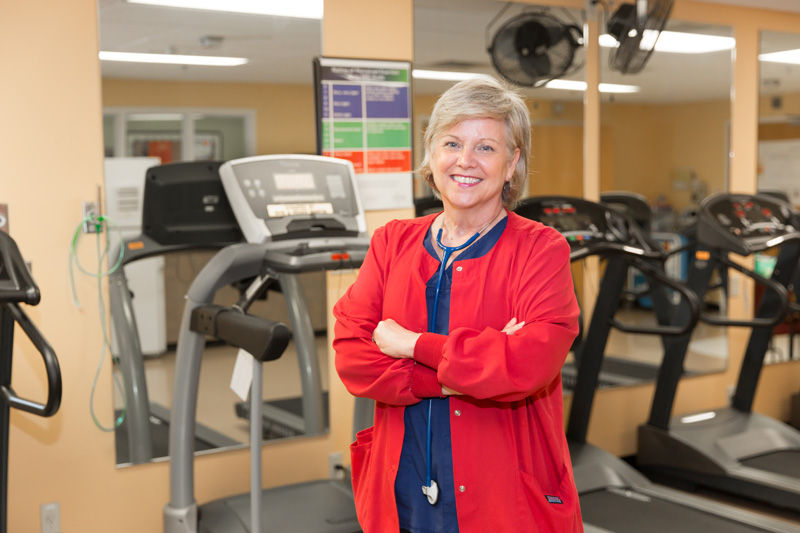You can “shop-til-you-drop” for clothes by Karl Lagerfeld, Zac Posen, Giorgio Armani or Ralph Lauren.
You may even find something “drop-dead gorgeous.”
What you won’t find is any designer label that can keep you – quite literally – from simply dropping dead.
For that, you need to seek out the Zoll Medical Corporation of Pittsburgh, Pa., and its LifeVest – a wearable defibrillator for patients at high risk for sudden cardiac arrest.
Vero Beach heart patient Joan Knapp knows a thing or two about Zoll vests and so does Indian River Medical Center registered nurse Harriett Sparkman at the hospital’s cardiac rehabilitation program.
Unlike a surgically implanted defibrillator, Zoll’s LifeVest is worn outside the body. It continuously monitors a patient’s heart to detect any life-threatening arrhythmias and, if needed, delivers an electrical shock to restore the heart’s normal rhythm.
According to Zoll, the LifeVest, the first “wearable” defibrillator on the market, was “extensively tested for three years in 17 major medical centers across the U.S.” before receiving FDA approval.
Battery-powered, the vests are equipped with a series of magnets and electrodes sewn into the lining which constantly monitor the heart. Patients are asked to keep them on 24 hours a day except when showering or bathing.
Sparkman says patients “get them when they’re in the hospital” and then a couple of weeks after discharge, they report to her at the cardiac rehab program.
The vest’s use in the cardio-rehab world is actually part of a dual-pronged process.
The overlying goal is to see if a combination of exercise, diet and medication can improve the “ejection fraction” of patients at the highest risk for sudden cardiac arrest while preventing potentially fatal heart attacks in the process.
An ejection fraction – or EF – is a measurement of the heart muscle’s ability to contract effectively enough to pump oxygen-rich blood out to the rest of the body.
The American Heart Association says “a normal heart’s ejection fraction may be between 50 and 70 while a measurement under 40 may be evidence of heart failure or cardiomyopathy.”
Sparkman, however, says she regularly sees patients with EF rates of 20, 25, 30 and 35.
The good news?
According to Sparkman, “One patient’s EF went from 25 or 30 up to 52 in just eight weeks. It was awesome.”
Another, says Sparkman, went from 35 all the way up to 59 in only five weeks.
Today those patients, like Joan Knapp, no longer need to wear their LifeVests.
Those kinds of results haven’t gone unnoticed by the participants in other parts of IRMC’s cardio rehab program.
“The program,” Sparkman says, “is for anyone who has had a heart attack, bypass surgery, valve surgery, angioplasty, stent or congestive heart failure.”
“Patients love us,” exclaims Sparkman, “they really do. They donate equipment all the time. You see their names all over the equipment out there. The hospital has only bought two pieces of the equipment we have.”
Since there are easily 20 to 30 pieces of sparkling new stainless steel exercise equipment in plain view, Sparkman’s claim that patients have “donated 90 percent of the equipment” may be something of an understatement.
In fact, with an expansion of the cardio rehab center now set to begin, some patients have already made donations to help defray those costs as well.
Maybe Sparkman’s sense of humor and sensitivity to human nature play a role.
She recalls one elderly patient with a decades-long penchant for eating ice cream for breakfast. While attending a nutrition class, he grew a little flummoxed and asked, “What else can I eat instead of my ice cream?”
Sparkman’s response was classic. She asked the man how old he was and when he said 88, she replied, “You just keep eating your ice cream. You made it to 88 eating ice cream so don’t stop now if that’s what you want.”
That, in a nutshell, is the mission of Sparkman’s cardio-rehab program: Helping heart patients get what they want through exercise, diet and medication served with a side dish of understanding, compassion and just maybe a little ice cream.
For more information on IRMC’s cardio-rehabilitation program, call 772-567-4311 extension 2410.

